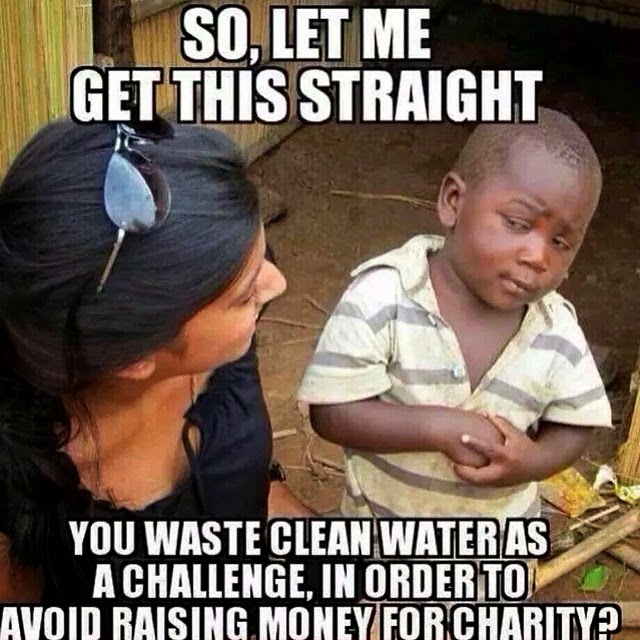For this post, I will discuss the three main criticisms regarding the Ice Bucket Challenge and how it applies to other recent social media stunts.
Criticism #1 – Comparisons with Africa
This tactic has been used long before the Ice Bucket Challenge to ridicule certain behaviours in industrialized countries, including the promotion of Apple products. Not to be rude or anything, but these comparisons have been overused and almost always get ignored, with the exception being well publicized crises such as the 2010 earthquake in Haiti. Yes, the issue of wasting water should not be taken lightly, but there is also the risk of money donated to help people in developing countries being hijacked by foreign governments unaccountable to us and use the solicitation of aid as a smokescreen to keep certain individuals in power.
 |
| One of many ice bucket memes shared on social media |
Criticism #2 - There are more important diseases to worry about
This depends on the individual. Sure, cancer has a greater impact than most other diseases with two in five Canadians being diagnosed with cancer in their lifetime, including my grandfather who died of cancer last year. You also have no shortage of fundraisers for cancer such as the Enbridge Ride to Conquer Cancer and the Canadian Cancer Society’s Relay for Life. If you ask someone whose loved ones were afflicted with ALS, however, they may have a different perspective. There is also the issue of whether or not people are able to donate and if so, how much they can.
While I will agree people should donate to causes they are passionate about, there is also a need to remain open to other causes. The same could be said about our political discourse. Just because the political establishment may not be interested in a particular idea does not mean it is any less deserving to be heard. As discussed in an earlier post, grassroots organizations such as OpenMedia and No Casino Toronto have been successful in changing the political discourse even with limited resources compared to business lobbyists.
Criticism #3 - It's another form of "slacktivism"
This will depend on how the challenge is responded. If you just dump the ice bucket without making a donation, then it is a form of "slacktivism". Donating to the cause, whether or not it is accompanied with the ice bucket, is meaningful action. Volunteering for the cause would be the strongest form of action outside of being a researcher working on treatments, but this would more likely be done by those who are more directly impacted by ALS.
Other forms of "slacktivism"
“Slacktivism” means performing an act that requires very little physical, mental, or financial effort while thinking it would make a difference, even though it does not. These include liking a Facebook status, using a particular Twitter hashtag as Bell promoted with their Let’s Talk campaign for mental health, and buying products which claim the company will donate a percentage or amount for a particular cause. On the issue of per product donations, there are often disclaimers stipulating a maximum amount. If there is one thing these “slacktivism” tools do provide, it’s awareness to a cause that people may not otherwise have known. Still, awareness needs to be backed up with action, which involves making lifestyle changes, donating, volunteering, and discussing the issue with our colleagues.
Ice away!
Rob Z (e-mail)
Follow @RZaichkowski
No comments:
Post a Comment